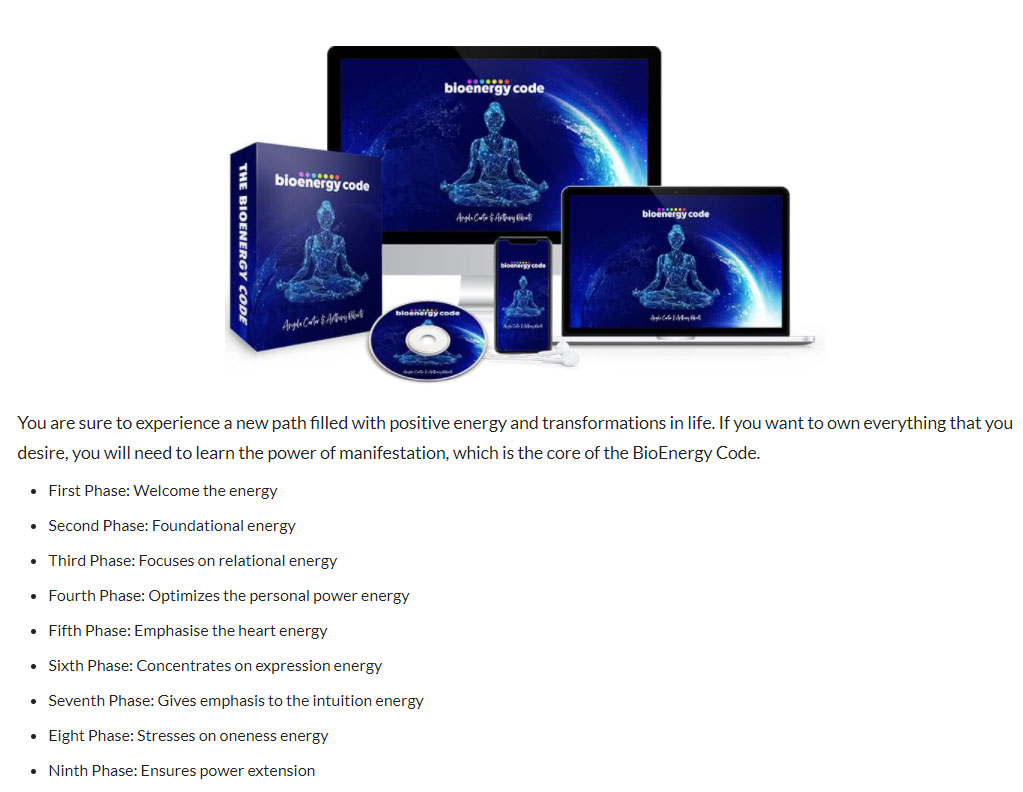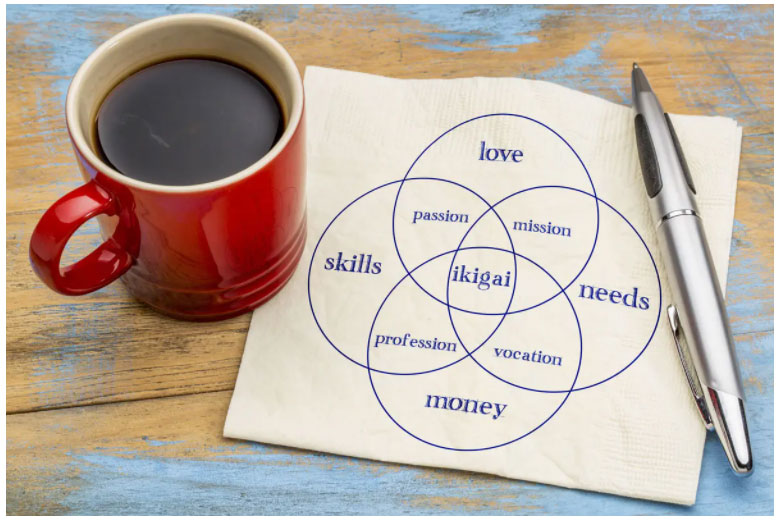Ikigai meaning
Each of us, at one time or another in our lives, had no idea what we could have done with our lives, both professionally and personally. A feeling of de-motivation and the sensation of being lost appears: it is a classic and understandable feeling.
From that moment on, you have two choices: either you go through your life (a mundane job, with or without a headache), or you take action, and really and actively seek your way. Do you really want to be happy? Of course I do! To achieve this, discover a concept that comes straight from Japan: Ikigai. If you have never heard of this Japanese method, read carefully what follows! We will see how to find your ikigai.
What is Ikigai?
Textually, Ikigai means both "joie de vivre" and "raison d'être". In fact, it is more of an interpretation than a word-for-word translation. Considered as a true philosophy of life in Japan, it consists in finding a meaning to one's life, and even more precisely a balance, which gives a reason to get up every morning in joy and good mood.
According to a study, it is the reason for the good health and longevity of the inhabitants of the Okinawa region. The Okinawa region has about five times as many centenarians as the United States, for example. People in this region practice this concept on a daily basis. An important phrase to remember, which helps to understand the purpose of the Ikigai, is: "I am where I should be".
It is important to know that the Japanese believe that work should be a source of pleasure, happiness and fulfillment. They do not have the same relationship with retirement as we Europeans, because we think (wrongly) that a job is above all a way to earn money. This is in fact false: money is only the purpose of work, not a vital need. That's why you need to find a job that you are really passionate about: that way, you won't feel like you have to work, as the saying goes.
What is the principle of Ikigai?
Very simply, Ikigai allows the user to identify what makes him/her really happy, to finally find his/her way in life. We could also define it as our "life mission": it is, in a way, the reason and motivation that mainly makes us love our existence.
Generally, it is rather used for the professional field, because it allows to find "the job of one's dreams". This concept highlights an important fact: everyone has an Ikigai. The most difficult thing is to succeed in asking the right questions and to find it, after a period of research. This necessarily requires a lot of personal introspection.
To help you, here are the four elements that balance the Ikigai:
• Find out who you're passionate about
• The field where you are gifted
• What the world needs
• What you might get paid for.

The Ikigai, much more than just a hobby!
In fact, it is more clearly a part of your own personality. An Ikigai is not necessarily a passion or a hobby, it can also very well be a form of personal fulfillment: helping others, communicating with other people, guiding in turn... Finally, as long as there are human beings, men and women on Earth, there will be as many Ikigai.
In fact, there will be even more, since you may not necessarily have only one in your lifetime. Now it is up to you to find yours!
How to find your Ikigai?
In truth, this quest is far from being easy to achieve. To try to find your Ikigai, you are asked four sets of questions that you must answer. But beware: you have to think deep down in your unconscious mind, and find sincere and meaningful answers (for you) in order to discover one of the facets of your Ikigai.
Sometimes you will have no idea: even if it takes several days or weeks to answer a question, don't worry, this is perfectly normal. Everyone must move at their own pace, to be sure to find their true ambition.
Here are the 4 groups of questions you've been waiting for:
• What do you like in life? What are you passionate about and what do you like to do? Why do you want to get up in the morning? What is your source of motivation, even when you're feeling down?
• What activities are you good at? If you can't find an answer to this question, here's a different formulation: What activities don't require a lot of effort to succeed? Do you regularly receive compliments for an activity you do?
• Do you have a cause that is close to your heart? What facts sadden you or make you want to react? Do you have one or more associations that are dear to your heart? Do you feel like getting involved in a cause/association?
• What can you really bring to others? What are your strong points that you would like to make available to others? Would they be able to pay you for an action? If so, which one in particular?
For each question, there may obviously be several possible answers, depending on how you feel.
Achieving the perfect balance
Once you have answered all these questions, all you have to do is position them directly in the previous diagram. Each circle overlaps to create a new space, which corresponds to a higher element in the Ikigai. There are four of them.
• Your passion(s): it's about merging the answers from the circles of "what you're passionate about" and "what you're good at".
• Your ideal profession: As with passions, simply link your "what you're good at" and "what you could be paid for" circles. This will help you discover the work that fits your current state of mind.
• Your vocation: it includes answers to the questions "what you could be paid for" and "what everyone needs".
• Your current mission: Finally, mix the circles of the categories of "what you are passionate about" and "what everyone needs" to find the life mission promised to you.
All these four groups created themselves a last point: your Ikigai.
Good, you have just reached your goal, you now know your reason for being.
You will certainly be surprised to see that your Ikigai is not necessarily a profession. Of course, if this is the case, it's good news for you; otherwise, it's simply that the work corresponds to only one factor of your raison d'être. The rest may be leisure, free time or associative commitment .
Enjoy your Ikigai to the fullest
To make it truly useful, you need to apply it every day, in every area of your life. For some people, it will be easy to leave everything behind, and start again activities closer to their Ikigai, while others will be able to succeed in evolving and accomplishing life missions without giving up anything. The main objective is not specifically to find one's Ikigai, but rather to succeed in applying it in daily life!
Find yourself a passion
Thanks to the Ikigai test, you have probably found one or more activities that really make you feel good inside. For those who are afraid of having to leave their financial security, don't hesitate to develop one of these activities in parallel with your work. For example, if you like to paint, you can devote yourself to it during your free time, and why not, try to exhibit your paintings in an art gallery. The goal is to feel completely in adequacy with your life aspirations.

Plan a dedicated time
To be in the same logic as the previous point, once you have determined one (or more) activity to practice, you must reserve a niche for it, and stick to it. Simply start with once a week, for example on Sunday afternoon, for one hour. In this way, you force yourself to do activities that bring you joy in your daily life. Gradually increase this time if you feel you want or need to practice more to be in tune with your Ikigai.
Putting your Ikigai to work
The purpose of an Ikigai is to find happiness and joy at last, but if you manage to turn your passion into a profession, it's a double winner! Succeeding in earning a living while being completely fulfilled is not given to everyone, because you have to foresee all the facets of the project before starting. Despite the difficulties, you must never give up, because one day or another it will pay off. Nothing prevents you from realizing this dream, little by little, and seeing your work grow.
Moreover, it is worth remembering that Ikigai is not necessarily linked to "professional success", since it is based on the values that YOU define as important. Do not rely on outside opinions or the malicious thoughts of others, which could interfere with your research.
While a person A will do his or her job entirely, even with a low salary, a person B will do it without having a particular degree, and a person C will sometimes flourish outside even the codes of our society, etc. There is no "bad" choice or mission in life!
A Preliminary Mental Preparation
To continue in this logical sequence, it must be recognized that people are used to assimilating the world of work with the remuneration that is attributed to it. A mental programming that forces them to think of it as a means of survival to meet vital needs.
Money is inevitably a sensitive subject, which everyone thinks about, because it represents psychological security, just behind that of eating, drinking... But it turns out that it is also a hindrance to your personal development. To succeed in making your projects come true, whether professional or not, you must free yourself from this barrier that is money. Prefer to focus on the "aspiration" element, and then, in a second step, think about the financial aspect that can result from it.
Harmonizing your Ikigai: the challenge of a lifetime!
Once you have successfully completed the Ikigai test, and you finally have access to your full potential, know that it is not eternal. As our lives are constantly evolving, your aspirations and desires change over time, shaping your mind (and even your body). However, maybe the Ikigai you have today will not be the same in 5, 10 or 15 years.
This is what slightly complicates the concept of Ikigai, but in the end, this is a good thing: this movement means that you don't stagnate, and even better, that you evolve and refine yourself over time. Your aspirations, dreams, passions and attractions in life evolve with your age. It is therefore logical that it is the same with your Ikigai.
Do not hesitate, when the time is right, or simply when your heart tells you to, to try again to answer the Ikigai's questions. Whether it is to check if your expectations are still the same, or to evaluate if your future prospects are still in line with yourself. Be on the lookout, and you will remain animated by an intense passion all your life!


